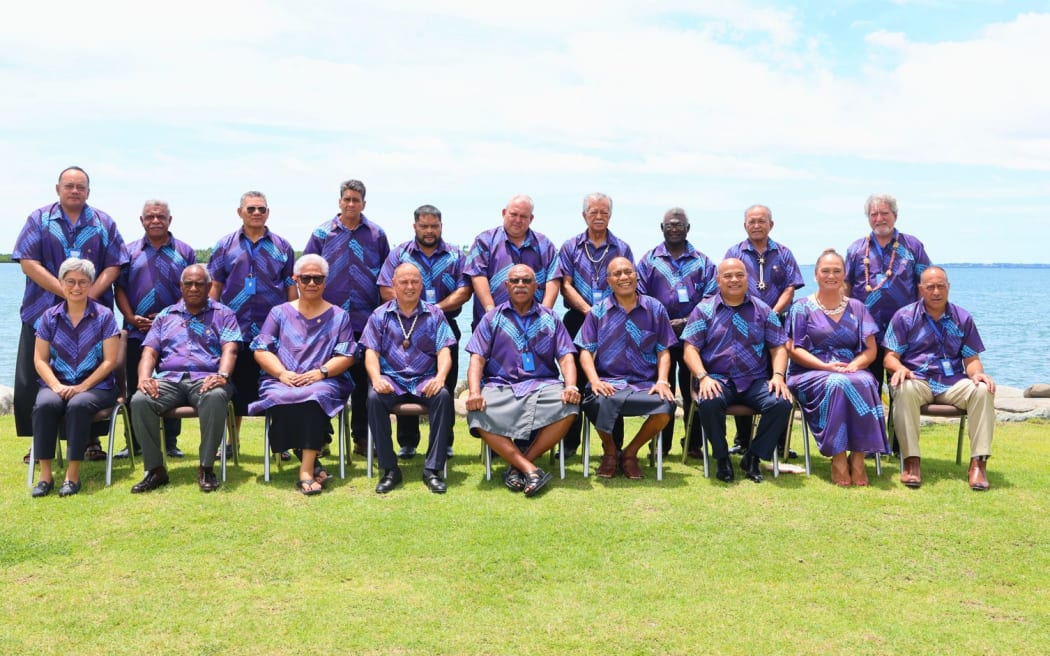By Lydia Lewis, RNZ Pacific journalist, and Kelvin Anthony, RNZ Pacific digital and social media journalist
The Pacific Islands Forum (PIF) is now “a family reconciled” as its leaders have reaffirmed their commitment to reforms to strengthen the regional body.
Stepping back into the fold, Kiribati President Taneti Maamau inked the final signature on the Suva Agreement ending two years of uncertainty and marking the start of a new chapter for Pacific solidarity.
“In unity we will surely succeed,” Maamau told RNZ Pacific.
“We have a duty as a Pacific family to keep us together and to meet the challenges together,” he added.
The reforms deemed “non-negotiables” include the endorsement of Micronesian candidates for certain regional roles and the establishment of two sub-regional offices in the north Pacific.
The result is Nauru’s former president, Baron Waqa, is set to become the next PIF secretary-general starting in 2024.
Current Forum Deputy Secretary-General Filimon Manoni, a Marshall Islander, will become the Pacific Ocean Commissioner hosted in Palau, and Kiribati will be home to the PIF sub-regional office in Micronesia.
Australia and New Zealand have agreed to foot the bill and committed to “transitional funding of NZ$3 million towards the operationalisation of the Suva Agreement” over the next three years.
“The fracture is now history,” outgoing PIF Secretary-General Henry Puna said.

“We have all collectively decided to move on and today we have cemented that . . . we are not looking back at all,” Puna said.
A range of other issues were also discussed by the leaders, such as Japan’s plans to release over a million tonnes of treated nuclear wastewater into the Pacific Ocean.
“Forum leaders reaffirmed the importance of science and data to guide the political decisions on the proposed discharge,” the final communique for the 5th Forum Special Leaders Retreat stated.
They also agreed – in response to increased geopolitical tensions in the region – to establish a permanent representation at the UN and in Washington in the form of a PIF special envoy to the United States to “report back to Leaders at the 52nd Pacific Islands Forum Leaders Meeting in the Cook Islands.”
Fiji passes baton to Cook Islands
Fiji Prime Minister Sitiveni Rabuka said he was “pleased to be able to contribute” towards the final outcomes of the Nadi meeting.
“As I hand over the baton, I know that we are in good hands as we paddle our drua (canoe) to achieve our collective aspirations,” said Rabuka in his final statement as outgoing Forum chair.
The chairmanship has been transferred to the Cook Islands which will host the 52nd PIF summit later this year.
Cook Islands Prime Minister Mark Brown has promised to keep the region’s “unity intact”.
Brown said that while the main challenges in the Suva Agreement had been overcome with the allocation of offices within the region, “resourcing and financing” were issues that would need attention.
“We have to thank the governments of Australia and New Zealand for providing that support for the next three years,” he said.
“But I would expect that there will be more work done by officials to actually finalise what the financing requirements will be as negotiations will take place for costs and resources.”
The final member of the Forum Troika and next in line for chair is Tonga.
Other decisions
Other decisions set out in the communique included:
- PIF leaders pledging their support for Australia’s joint bid to host COP31 alongside Pacific countries.
- Support for a draft resolution to the UN General Assembly seeking an advisory opinion from the International Court of Justice on climate change and human rights.
This article is republished under a community partnership agreement with RNZ.